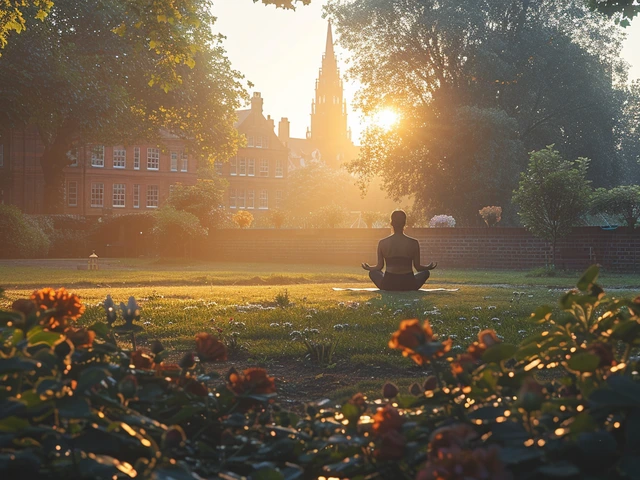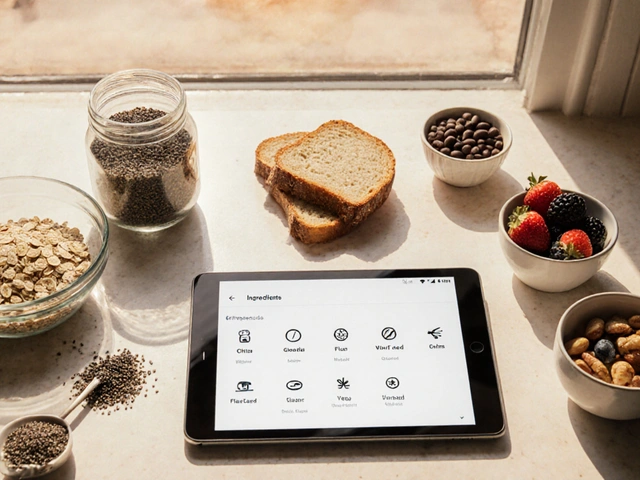In an age where daily life feels like a constantly shifting tempest, learning to navigate stress with grace and resilience is invaluable. Calmness is not just a quaint notion reserved for the monasteries or yoga retreats; it is an essential skill that can dramatically improve your quality of life. Imagine handling crises with the same composure as a seasoned sea captain—steering through turbulent waters with an unflappable demeanor.
Delving into the art of calmness means unlocking methods to manage stress, enhance well-being, and foster a healthier mental state. Through mindfulness, meditation, and an understanding of psychological strategies, one can achieve tranquility amidst life's storm. Join me as we uncover simple yet effective techniques to cultivate calmness and harvest its benefits, crafting a balanced life in the process.
- The Essence of Calmness
- Calmness in Daily Life
- Mindfulness and Meditation Practices
- The Psychological Benefits of Staying Calm
- Practical Tips for Cultivating Calmness
- Achieving Long-term Balance through Calmness
The Essence of Calmness
Calmness isn't just a passive state of being; it is an active pursuit of balance and composure despite external turmoil. In essence, calmness is the ability to remain unperturbed, managing one's thoughts and reactions to turn potential chaos into opportunities for reflection and growth. This skill becomes a powerful tool in navigating life’s pressures and demands.
Understanding Calmness
At its core, calmness encompasses a stable mind and the emotional resilience to handle stressful situations. Historical wisdom and modern psychology both underscore calmness as a foundational element of mental health. For instance, ancient Eastern philosophies such as Buddhism often highlight mindfulness and meditation as pathways to inner peace. Meanwhile, contemporary studies have demonstrated that consistent meditation practices can lead to measurable changes in brain regions associated with stress management.
The Science Behind Calmness
One of the fascinating aspects of calmness is its impact on our neurobiology. Research shows that practicing mindfulness regularly can decrease the size of the amygdala, the brain's fight-or-flight center, which is associated with stress response. Simultaneously, it strengthens the prefrontal cortex, which is responsible for decision-making and emotional regulation. These neural changes contribute to a more composed and less reactive demeanor over time.
| Aspect | Benefits |
|---|---|
| Meditation | Reduction in stress responses, improved focus |
| Mindfulness | Increased emotional regulation, decreased anxiety |
| Calmness Practices | Improved mental health, greater resilience |
Bringing Calmness Into Your Life
Incorporating calmness into daily life doesn't require significant lifestyle changes; simple adjustments can lay the groundwork for a more peaceful existence. Start by setting aside a few minutes each day for mindful breathing exercises. Consciously focusing on your breath helps ground you in the present moment, creating a sense of calm that can permeate through the day's challenges.
Making these practices a sustainable part of your routine is crucial. Like honing any skill, consistency is key. By gradually integrating these practices, you establish a robust foundation for a balanced life, where reactions are measured and thoughts are clear. As you hone the art of calmness, you not only enhance your mental landscape but also positively influence those around you, creating ripples of tranquility in an often hectic world.
Calmness in Daily Life
Incorporating calmness into our daily lives doesn't require grand gestures or sweeping changes. It's about making small, intentional shifts that over time create a ripple effect towards a more centered existence. In our bustling cities and fast-paced routines, finding calm might seem like chasing the wind, yet there are simple, tangible practices you can adopt to nurture this essential skill.
Mindful Mornings
Starting your day with mindfulness can set a positive tone unlike any other. Before you reach for your phone, take a few moments to sit in silence, focusing on your breath. This creates a calm foundation before the chaos of the day unfolds. Even just five minutes of meditation can decrease stress and enhance your ability to stay focus throughout the day.
Calm Commutes
Commuting is a part of life that often falls out of our control, yet it doesn't have to be a source of stress. Listening to soothing music, an inspiring podcast, or practising deep breathing while traveling can turn potential road rage into peaceful contemplation. By transforming potential stressors into moments of zen, we reclaim control over our responses.
Balance in Work Spaces
Work is where many of us spend the majority of our time, and it can often be a hub of stress. Incorporating regular breaks for stretching or deep breathing can re-energize and recenter. Consider implementing a 'power hour' where you focus intensely on a single task, followed by a ten-minute break to recharge.
A Refreshing Environment
Your physical environment can significantly impact your mental state. Workspaces or living areas that are cluttered and disorganized can elevate stress levels. Taking time to declutter and organize can lead to clearer thinking and enhanced calmness.
Furthermore, incorporating elements such as plants or aromatherapy can subtly promote peace. Studies have shown that the presence of plants reduces stress and improves concentration. Similarly, certain scents like lavender and chamomile can induce feelings of calm.
Evening Rituals for Relaxation
The way you unwind in the evening has a profound effect on how quickly calm becomes a default setting in your life. Establish a routine that signals relaxation to your brain: perhaps a warm bath, reading a book, or practicing gentle yoga stretches. Consistency is key. Over time, these rituals will signal your body to ease into a restful state.
- Unplug before bedtime to reduce blue light exposure.
- Practice gratitude journaling to reflect on positive moments of your day.
- Create a calming playlist to play while preparing for sleep.
Embracing calmness in daily life is a journey of small, deliberate choices that prioritize peace over pressure. It is about valuing your inner tranquility as a sacred component of life, much like the air you breathe. As you weave these practices into your daily routine, you'll find that life's tumultuous waves are no longer obstacles but gentle reminders of the serenity that truly lies within.
Mindfulness and Meditation Practices
Mindfulness and meditation have become buzzwords in recent years, but their roots dig deep into ancient history, offering profound benefits. Practicing mindfulness means being fully present in the moment—without judgment or distraction. It's about experiencing each moment as it is, rather than dwelling in the past or worrying about the future.
Understanding Mindfulness
Mindfulness, as a practice, is simple but not easy. It involves paying attention to the here and now, fostering a sense of awareness that can lead to increased calmness and reduced stress. A well-known method of incorporating mindfulness into daily life is through mindful breathing. This involves focusing on natural breathing patterns, feeling the air inflate your lungs, then noticing it leaving your body.
The Power of Meditation
Meditation is a structured practice of focused attention and awareness that can enhance one's ability to maintain a calm state of mind. Different forms of meditation, such as transcendental and guided meditation, have been shown to have varying effects on stress reduction and mental clarity.
Guided Meditation Techniques
- Body Scan Meditation: This involves paying attention to different parts of your body, checking in with any tension or discomfort, and letting it go.
- Loving-kindness Meditation: Focused on cultivating love and compassion towards oneself and others, it can enhance inner peace.
Recent studies indicate that regular meditation practice can alter the brain's neural pathways, making you more resilient to stress.
Incorporating Mindfulness and Meditation in Daily Life
Integrating these practices into your routine doesn’t require hours on end. Begin with short, five-minute sessions daily, gradually increasing the duration as you become more comfortable. The key is consistency and making it a part of your lifestyle.
Mindfulness and meditation are invaluable tools in the pursuit of a balanced life. Whether you're juggling household duties, work stress, or the demands of being a parent, taking even a few minutes a day for these practices can foster significant change. The time invested in these practices will pay off with dividends of increased clarity, peace, and calmness.

The Psychological Benefits of Staying Calm
In a world flooded with stimuli and pressure, staying calm offers profound psychological benefits that can transform both mindset and personal relationships. Embracing calmness not only improves daily interactions but also shields mental health in the long run. Let’s delve into how maintaining serenity can enhance our lives in unexpected yet significant ways.
Reducing Stress and Anxiety
One of the primary psychological advantages of calmness is the capacity to reduce stress and anxiety levels. When we are calm, our body produces fewer stress hormones like cortisol. This reduction leads to a lessened risk of chronic issues such as heart disease and high blood pressure. By incorporating calmness into our daily routine, we cultivate a mental space resistant to panic and anxiety triggers.
Enhancing Focus and Concentration
A calm mind is more adept at maintaining focus and concentration. During moments of stress, the brain's prefrontal cortex, responsible for decision-making and concentration, can become impaired. Practicing calmness through mindfulness and meditation helps clear mental clutter, allowing for improved cognitive function and a sharper focus on tasks at hand.
Improving Emotional Regulation
People who remain calm in stressful situations tend to regulate their emotions better. Emotional regulation is crucial for maintaining stable relationships and making sound decisions. When calmness is achieved, it becomes easier to understand and manage one's emotions, resulting in a more balanced emotional state.
Fostering Healthier Relationships
The ripple effect of a calm disposition can be seen in personal and professional relationships. Individuals who practice calmness are often seen as reliable, grounded, and understanding. Their ability to remain composed fosters trust and encourages open communication, which are essential components of healthy relationships.
Strengthening Resilience
Calmness serves as a pillar for building resilience. By staying calm in the face of adversity, we learn to see challenges as opportunities for growth rather than setbacks. This mindset shift empowers individuals to bounce back from difficulties with greater strength and fortitude.
Interesting Statistic
Research has shown that individuals who engage in regular meditation, a practice centered on finding calmness, report a 25% reduction in symptoms of anxiety and stress over a five-year period, showcasing the long-term psychological benefits of maintaining a calm mind.
Ultimately, the psychological benefits of staying calm are profound and far-reaching, emphasizing why it's a skill worth nurturing for anyone seeking a balanced, fulfilling life.
Practical Tips for Cultivating Calmness
Cultivating calmness is akin to nurturing a garden—it requires time, consistency, and the right techniques. In a world brimming with distractions and stressors, embedding tranquility in your routine might seem daunting, but it is entirely possible and incredibly rewarding.
1. Mindful Breathing Techniques
One of the simplest yet most effective methods to induce inner peace is through mindful breathing. Focused breathing helps in anchoring your mind and alleviating stress. Try this: take a deep breath in through your nose, hold it for a count of four, and exhale slowly through your mouth. Repeat this for a few minutes whenever you feel overwhelmed.
2. Incorporate Meditation into Your Routine
Meditation is a powerful tool for enhancing calmness and fostering emotional stability. Start with just five minutes a day. Find a quiet corner, sit comfortably, close your eyes, and focus on your breath or a specific mantra. Numerous studies have shown that regular meditation can lower heart rates, reduce anxiety, and promote a profound sense of calm.
3. Prioritize Exercise and Physical Health
Physical activity is directly linked to mental well-being. Regular exercise releases endorphins, which are natural mood lifters, helping you maintain a balanced state of mind. Whether it's a brisk walk, yoga, or a high-intensity workout, fitting exercise into your daily schedule can significantly enhance your ability to remain calm under pressure.
4. Create a Calm Environment
The spaces we inhabit profoundly affect our mood. Declutter your living area and incorporate soothing elements like plants, soft lighting, or calming colors. Consider reducing noise pollution by using earplugs or calming music playlists.
5. Embrace Technology Cautiously
Our gadgets can be frenetic conduits of stress, from constant notifications to news overload. Set boundaries by establishing tech-free zones in your home or allocating specific times for digital detox. This helps in reducing the perpetual stimuli that can deter you from achieving inner peace.
6. Journaling and Self-Reflection
Journaling is a cathartic practice that enables you to process emotions and gain perspective. By reflecting on your day, you can identify patterns or triggers that disrupt your peace, allowing you to address them proactively.
By incrementally integrating these habits into your life, you can cultivate enduring calmness and navigate life’s challenges with poise and balance. Remember, it’s not about immediate transformation but the slow, steady adoption of habits that lead to a more serene existence.
Achieving Long-term Balance through Calmness
Creating a sustainable life balance through calmness is an art that complements our fast-paced world. The practice of nurturing calmness in everyday life has a profound impact on both mental and physical health. It helps mitigate stress, an all-too-common visitor, and ensures that your inner peace becomes a steadfast companion.
Mindfulness: Your Daily Anchor
Mindfulness is a powerful tool for cultivating inner peace. By grounding oneself in the present moment, it becomes easier to identify stressors and respond to them constructively. Simple practices like mindful breathing or a five-minute body scan can make significant differences. In 2023, a study by the Journal of Behavioral Health found that individuals practicing mindfulness reported a 30% improvement in stress management.
Setting Realistic Goals
Establishing achievable goals is crucial for maintaining a balanced life. It's about aligning your objectives with your core values rather than getting swept away by endless to-do lists. Be selective and deliberate about personal and professional aspirations. This approach not only reduces overwhelming feelings but also fosters a sense of accomplishment and balance.
The Role of Physical Activity
Regular physical activity is a stress management powerhouse. It stimulates endorphin production, lifting your mood and promoting tranquility. The World Health Organization suggests at least 150 minutes of moderate exercise weekly for optimal health benefits. Consider incorporating activities like yoga or tai chi that fuse movement and mindfulness, amplifying the calming benefits.
Creating a Calming Environment
Environmental factors can significantly affect your sense of calm. Cultivate spaces that evoke serenity by decluttering and introducing elements like plants or soft lighting. Engage all senses—listen to soothing music or light a fragrant candle to create a calming atmosphere at home.
Consistent Sleep Patterns
Sleep is the cornerstone of a balanced lifestyle. Consistent rest replenishes cognitive function and emotional well-being. Aim for 7-9 hours of quality sleep, and establish a routine that signals winding down, such as reading a book or gentle stretching before bed.
Long-term Commitment
Finally, achieving long-term balance requires a commitment to maintaining your calming practices. Re-evaluate your strategies periodically, ensuring they continue to meet your evolving needs. Remember, calmness is as much about flexibility as it is about stability.
In essence, calmness is not a destination but a continuous journey. With mindful effort, strategic planning, and maintaining supportive habits, a harmonious life filled with resilience and balance is well within reach.






